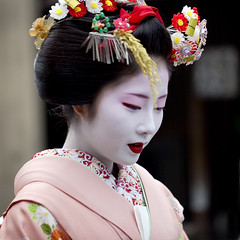According to figures from the National Tax Agency, average annual salaries for Japanese workers in their early 20s fell to 2.48 million yen in 2008, the latest year for which figures are available, from 2.83 million yen in 1997. At the current exchange rate, that is a decrease to $29,470, from $33,63.It is interesting, actually scary, that full-time employment at a company doesn't provide enough income by itself to support the lifestyles, even modest ones, of the younger generations.
Data released last week by the Japanese Ministry of Health, Labor and Welfare found that almost 56 percent of workers 15 to 34 years old needed another form of income to help pay living expenses.Some of the people highlighted in the article have been able to parlay the experience they gained in their second job into new entrepreneurial ventures allowing them to quit their main job. This entrepreneurship is something that Japan and its economy have traditionally lacked and if this spirit increases it could help Japan slowly claw its way out of economic stagnation and retreat.
The second article deals with the upcoming selection of a new Prime Minister by the DPJ, and highlights the revolving door of leaders that Japan has experienced over the last two decades. The first two paragraphs sum up the effects that a lack of leadership has wrecked on Japan and its economy.
Japan’s frequent leadership changes are dizzying and increasingly counterproductive. The country has had 14 prime ministers in the last two decades and could soon have another. That would make three in the last 12 months alone — hardly time enough to introduce new policies, much less effectively implement them.Who will be the new prime minister, Kan or Ozawa, and how long will he last? For more information and deeper analysis see the respective articles. They are worth the read.
This phenomenon would make successful governance difficult in any country. But Japan is the world’s third largest economy and a technological and regional power. It needs a prime minister who can offer robust, principled leadership over a sustained period, win support for economic policies that would help pull the world out of recession and maintain a strong alliance with the United States.
Aggccording to figures from the National Tax Agency, average annual salaries for Japanese workers in their early 20s fell to 2.48 million yen in 2008, the latest year for which figures are available, from 2.83 million yen in 1997. At the current exchange rate, that is a decrease to $29,470, from $33,635.




























